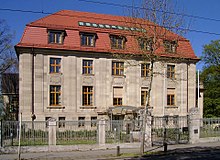Federal Court of Justice
![]()
BGH is a redirect to this article. For other meanings, see BGH (disambiguation).
For the historical Federal Supreme Court in Austria, see Federal Supreme Court (Austria).
The Federal Court of Justice (Bundesgerichtshof, BGH) in Karlsruhe is the highest court of the Federal Republic of Germany in the field of ordinary jurisdiction and thus the final instance in civil and criminal proceedings. It is also responsible for related special areas of law, such as professional law in the administration of justice. The Federal Supreme Court is to preserve the unity of the law and to develop the law, but above all to review the decisions of the courts subordinate to it. Along with the Federal Labour Court, the Federal Fiscal Court, the Federal Social Court and the Federal Administrative Court, it is one of the five supreme courts of the Federation (Article 95 (1) of the Basic Law) and, along with the Federal Constitutional Court, one of two federal courts with its seat in Karlsruhe, although two senates of the Federal Supreme Court are located in Leipzig.
The BGH mainly decides on appeals against judgments of the Regional Courts and Higher Regional Courts as well as on appeals against the orders of these courts. Like any court of appeal, it does not usually take evidence - unlike a court of appeal - but merely decides whether the judgment of the Regional Court or Higher Regional Court is based on errors of law.
In its capacity as an authority, the Federal Court of Justice - like the Federal Fiscal Court and the Federal Administrative Court - is subordinate to the Federal Ministry of Justice and Consumer Protection (BMJV) and is subject to its official supervision, while maintaining judicial independence.

Stamp "50 years Federal Court of Justice

Former Hereditary Grand Ducal Palace, today the main building of the Federal Supreme Court, Karlsruhe, 2012
Foundation and seat
The Federal Supreme Court was founded on 1 October 1950 and has had its headquarters in Karlsruhe ever since. As a predecessor institution, there was the Supreme Court for the British Occupation Zone with its seat in Cologne, which was dissolved at the end of September 1950. The 5th Criminal Senate of the BGH, on the other hand, was based in Berlin in order to maintain the "established links between West Berlin and the Federal Republic" and moved to Leipzig to the Villa Sack in 1997 on the orders of the Federal Minister of Justice. Originally, after the reunification of Germany, the entire BGH was to move to the historic Reichsgericht building in Leipzig, but this proposal could not be implemented politically, especially against the will of the judges. Leipzig therefore received only the 5th Criminal Senate in accordance with the recommendation of the Federalism Commission of 1992, which was "taken note of" by resolution of the Bundestag. On 22 August 2002, the Federal Administrative Court, which until then had also been located in Berlin, moved into the Reichsgericht building. In addition, the recommendation of the Federalism Commission stipulates that for each new civil senate established at the BGH, another criminal senate should move to Leipzig, which is referred to as the "sliding clause". However, since then there has been no establishment of new senates, but only the temporary establishment of two auxiliary senates (see Spruchkörper) and an increase in the number of senates. In 2017, the Minister of Justice of Saxony criticized this practice. When the Budget Committee of the German Bundestag approved the establishment of two new senates in November 2018, it is planned to take into account the "sliding clause" insofar as the new civil senate will be located in Karlsruhe and the new criminal senate in Leipzig.

Villa Sack (5th and 6th Criminal Senates), Leipzig ⊙51 .33251712. 345398
Court Organization
Adjudicative body
The judges of the Federal Supreme Court are divided into senates, each of which has a chairman and six to eight other members. Not all members participate in the individual decisions of the senates, but the judges work in so-called sitting groups. Pursuant to § 139.1 of the Judicature Act (Gerichtsverfassungsgesetz - GVG), these groups consist of the chairman and four assessors from among the other members, so that a senate as a panel of judges generally decides with five members. The number of senates is determined by the Federal Minister of Justice pursuant to § 130 of the GVG and has increased several times since the establishment of the Federal Supreme Court. Since 1990, there have been twelve civil senates, numbered consecutively with Roman numerals, and five criminal senates, numbered consecutively with Arabic numerals. In addition, from 2003 to 2004 there was an auxiliary senate (IXa-Zivilsenat) to temporarily relieve the IXth Civil Senate and from 2009 to 2010 there was another auxiliary senate (Xa-Zivilsenat) to temporarily relieve the Xth Civil Senate. Civil Senate. On 8 November 2018, the Budget Committee of the German Bundestag decided to allocate funds for the establishment of two new senates at the Federal Supreme Court, which could be established during 2019, subject to implementation in the Bundestag. The plan is to establish a sixth criminal senate in Leipzig and a thirteenth civil senate in Karlsruhe.
In addition, there are eight special senates. Six of them deal with professional law in the administration of justice, namely the Service Court of the Federation (which is responsible for service law proceedings of judges and members of the Federal Court of Audit), the Senate for Notaries' Cases, the Senate for Lawyers' Cases, the Senate for Patent Attorneys' Cases, the Senate for Auditors' Cases and the Senate for Tax Consultants' and Tax Agents' Cases. The other two are the Cartel Senate and the Senate for Agricultural Matters. The judges belong to the special senates in addition to their work in one of the civil or criminal senates, since the special senates meet only occasionally. Apart from the Cartel Senate, which, like the civil and criminal senates, is composed of five professional judges, the special senates decide in the composition of three professional judges and two honorary judges from the respective professional group, which, in the case of the Federal Service Court, may be two (professional) judges of the court of the person concerned.
Special investigating judges, the number of whom is determined by the Federal Minister of Justice, are appointed for decisions on applications for investigations by the Federal Public Prosecutor in criminal proceedings (e.g. house search, seizure, warrant of arrest), just as in other criminal courts (section 130 of the GVG). This activity is also in addition to that in one of the criminal or civil senates. Until 2016, there were for many years always six scheduled investigating judges, who devoted only a relatively small part of their deputation to these tasks. In 2017, this was changed to the effect that there are now two scheduled investigating judges who devote a larger part of their deputation to this task, as well as four deputies. The decisions of the investigating judges can in certain cases (Section 304 (5) of the Code of Criminal Procedure) be challenged by appeal, which is decided by a criminal panel of the Federal Court of Justice (small devolutive effect), which is then exceptionally staffed with only three judges pursuant to Section 139 (2) of the Code of Criminal Procedure.
Allocation of business
The allocation of the individual proceedings to the various senates is regulated in the court's business allocation plan. The principle of the statutory judge requires that it be determined from the outset, according to abstract-general criteria, which senate has jurisdiction over a case and in which composition before the Federal Court of Justice takes jurisdiction over a case. In this way, manipulation is to be avoided.
The business allocation plan of the Federal Court of Justice regulates the jurisdiction of the senates in civil cases according to the legal matters concerned, and in criminal cases as a rule according to which court issued the challenged decision. In addition, special responsibilities are assigned in particular to the first, third and fourth criminal senates. The complete business distribution plan is available for download on the website of the Federal Supreme Court. Currently (distribution of business 2019), the following competences roughly exist:
Criminal Senates
| First Criminal Circuit: | Districts of the Higher Regional Courts of Munich, Stuttgart, Karlsruhe, military criminal cases and offences against national defence as well as tax and customs criminal cases |
| 2nd Criminal Circuit: | Districts of the Higher Regional Courts of Frankfurt am Main, Jena and Cologne and other decisions without special allocation |
| Third Criminal Circuit: | Districts of the Higher Regional Courts of Düsseldorf, Oldenburg and Koblenz and state security matters |
| Fourth Criminal Circuit: | Districts of the Higher Regional Courts of Hamm and Zweibrücken and criminal traffic cases |
| Fifth Criminal Circuit: | District of the Court of Appeal (Berlin) and districts of the Higher Regional Courts of Bremen, Dresden, Hamburg, Saarbrücken and Schleswig |
| Sixth Criminal Circuit: | Districts of the Higher Regional Courts of Bamberg, Nuremberg, Rostock, Celle, Naumburg, Brandenburg and Brunswick, |
Civil senates
| I. Civil Senate: | Copyright law, trademark law, design law, unfair competition law, law governing the designation of varieties, transport law, brokerage law |
| II Civil Division: | Corporate law, law of associations |
| III Civil Division: | State liability law, notary liability, foundation law, contract law, management without mandate |
| IV. Civil Senate: | Inheritance law, insurance contract law |
| V. Civil Senate: | real estate law, neighbour law, residential property law, deprivation of liberty cases |
| VI Civil Division: | Law of torts |
| VII Civil Division: | Law of contracts for work and services, law of architects, law of compulsory execution |
| VIII. Civil Senate: | Purchase law, residential tenancy law |
| IX. Civil Senate: | Insolvency law, liability of lawyers, liability of tax advisors |
| X. Civil Senate: | patent law, public procurement law, travel contract law, gift law |
| XI. Civil Senate: | Banking law (loans, transfers of ownership by way of security, guarantees), capital market law |
| XII. Civil Senate: | family law, commercial tenancy law |
| XIII Civil Division: | Public procurement law, purchase contract, as far as the Renewable Energy Sources Act (EEG) or the Combined Heat and Power Act (Kraft-Wärme-Kopplungsgesetz) is concerned |
Other senates
| Cartel Senate: Appeals against decisions of the Cartel Senates of the Higher Regional Courts and further statutory jurisdiction |
| Service Court of the Federation: Tasks assigned under the German Judiciary Act and the Federal Court of Audit Act |
| Senate for notarial matters: Tasks assigned under the Federal Notarial Code |
| Senate on Bar Cases: Tasks assigned under the Federal Lawyers' Act |
| Senate for patent attorney cases: Tasks assigned under the Patent Attorneys' Act |
| Senate for Agricultural Cases: Agricultural cases under the Act on Judicial Proceedings in Agricultural Cases |
| Senate for Auditors' Cases: Tasks assigned under the Auditors' Code |
| Senate for tax consultant and tax agent cases: Tasks assigned under the Tax Advisory Act |
History of the distribution of business
The areas of jurisdiction of the senates have changed many times since the establishment of the BGH, for example, in order to take into account the increasing importance of certain areas of law and to achieve a balanced workload of the senates. This can be illustrated particularly clearly by the example of the regional jurisdiction of the five criminal senates for the districts of the Higher Regional Courts for the period from 1990 onwards:
Until reunification, the 5th Criminal Senate was based in West Berlin, but always had jurisdiction over other West German Higher Regional Court districts. In the course of reunification, the senate was relocated to Leipzig, but retained jurisdiction for the (then enlarged) Land of Berlin until today.
In the first years after reunification, the district courts of the GDR continued to exist in the new Länder. Each criminal senate was assigned jurisdiction over the district courts in one of the five Länder (Mecklenburg-Western Pomerania to the 1st criminal senate, Thuringia to the 2nd criminal senate, Saxony to the 3rd criminal senate, Saxony-Anhalt to the 4th criminal senate and Brandenburg to the 5th criminal senate). It was not until 1993 and 1994 that the Higher Regional Courts of Jena, Naumburg, Rostock, Brandenburg and Dresden were established.
Even after reunification, individual Higher Regional Courts were occasionally placed under the jurisdiction of another criminal senate.
In 1991, for example, the Oldenburg Higher Regional Court changed from the 5th to the 3rd Criminal Senate (Figure 2), and in 1993 the Rostock Higher Regional Court changed from the 1st to the 4th Criminal Senate (Figure 3).
In 1998, the Celle and Dresden Higher Regional Courts swapped senates, i.e. from 1998 onwards, Celle was assigned to the 3rd Criminal Senate and Dresden to the 5th Criminal Senate (Figure 4).
In 2010, the jurisdiction for the Higher Regional Court of Schleswig changed from the 3rd to the 5th Criminal Senate (Figure 5) and in 2012 the jurisdiction for the Higher Regional Court of Rostock changed from the 4th to the 3rd Criminal Senate and for the Higher Regional Court of Saarbrücken from the 4th to the 5th Criminal Senate (Figure 6).
In 2014, the southern regional courts of the Karlsruhe Higher Regional Court were assigned to the 4th Criminal Senate. Furthermore, the jurisdiction of the Higher Regional Court Koblenz changed from the 2nd to the 3rd Criminal Senate (Figure 7).
In 2015, the jurisdiction of the Rostock Higher Regional Court was changed for the third time: now to the 2nd Criminal Senate (Figure 8).
As of September 2019, the southern districts of the Regional Court of Appeal in Karlsruhe have been reassigned to the 1st Criminal Senate.
With the re-establishment of the 6th Criminal Senate of the Federal Court of Justice, the OLG districts of Bamberg and Nuremberg (from the 1st Criminal Senate), Rostock (from the 2nd Criminal Senate), Celle (from the 3rd Criminal Senate), Naumburg (from the 4th Criminal Senate) and Brandenburg as well as Braunschweig (from the 5th Criminal Senate) were assigned to it in February 2020.
· 
Picture 1: 1990
· 
Picture 2: 1991 and 1992
· 
Figure 3: 1993 to 1997
· 
Figure 4: 1998 to 2009
· 
Figure 5: 2010 and 2011
· 
Figure 6: 2012 and 2013
· 
Figure 7: from 2014
· 
Figure 8: from 2015
· 
Figure 9: from 15 February 2020
How it works
If a case has been assigned to the competent senate by the allocation of business of the court, the internal allocation of business of the senate to be decided by the judges of the respective senate pursuant to § 21g GVG before the beginning of the fiscal year subsequently determines in which staffing the case is decided and which judge is the rapporteur, i.e. processes the files and prepares the case. The presiding judge does not act as rapporteur, but reads the files of all cases assigned to the Senate in addition to the respective rapporteur (dual control principle).
The Senate meets at regular intervals for deliberations, which in civil cases are prepared by "votes" (expert opinions and proposals for decisions) by the respective rapporteurs. In criminal cases, on the other hand, each judge orally summarizes the cases assigned to him as rapporteur and highlights the legal problems. The case is then discussed jointly. Under certain conditions, which are described in the section on procedure, the Senate may decide by written order on the basis of the result of the deliberations without a hearing taking place. Otherwise, a hearing is scheduled, which is in principle open to the public. A hearing in revision cases corresponds to a discussion between the judges and the parties to the proceedings on the question of whether the challenged judgment is based on errors of law. In the subsequent deliberation on the judgment, if there is no agreement, a decision is reached by vote, with each of the five judges having one vote. The decision is then pronounced as a judgment.

deliberation room
Questions and Answers
Q: What is the Bundesgerichtshof?
A: The Bundesgerichtshof is the highest German court for civil and criminal law.
Q: How many Supreme Courts are there in Germany?
A: There are five Supreme Courts in Germany.
Q: What are the other four Supreme Courts in Germany?
A: The other four Supreme Courts are the Bundesarbeitsgericht, the Bundesfinanzhof, the Bundessozialgericht, and the Bundesverwaltungsgericht.
Q: What kind of cases do the Supreme Courts hear?
A: Each Supreme Court hears cases about their areas of law.
Q: Can someone appeal from any of the supreme courts?
A: No, there is no appeal from any of the supreme courts, unless someone's human rights are affected.
Q: What kind of cases would fall under the jurisdiction of the Federal Constitutional Court?
A: Cases which involve the infringement of human rights would fall under the jurisdiction of the Federal Constitutional Court.
Q: What is the role of the Federal Constitutional Court?
A: The Federal Constitutional Court is responsible to decide whether or not a person's human rights have been violated.
Search within the encyclopedia